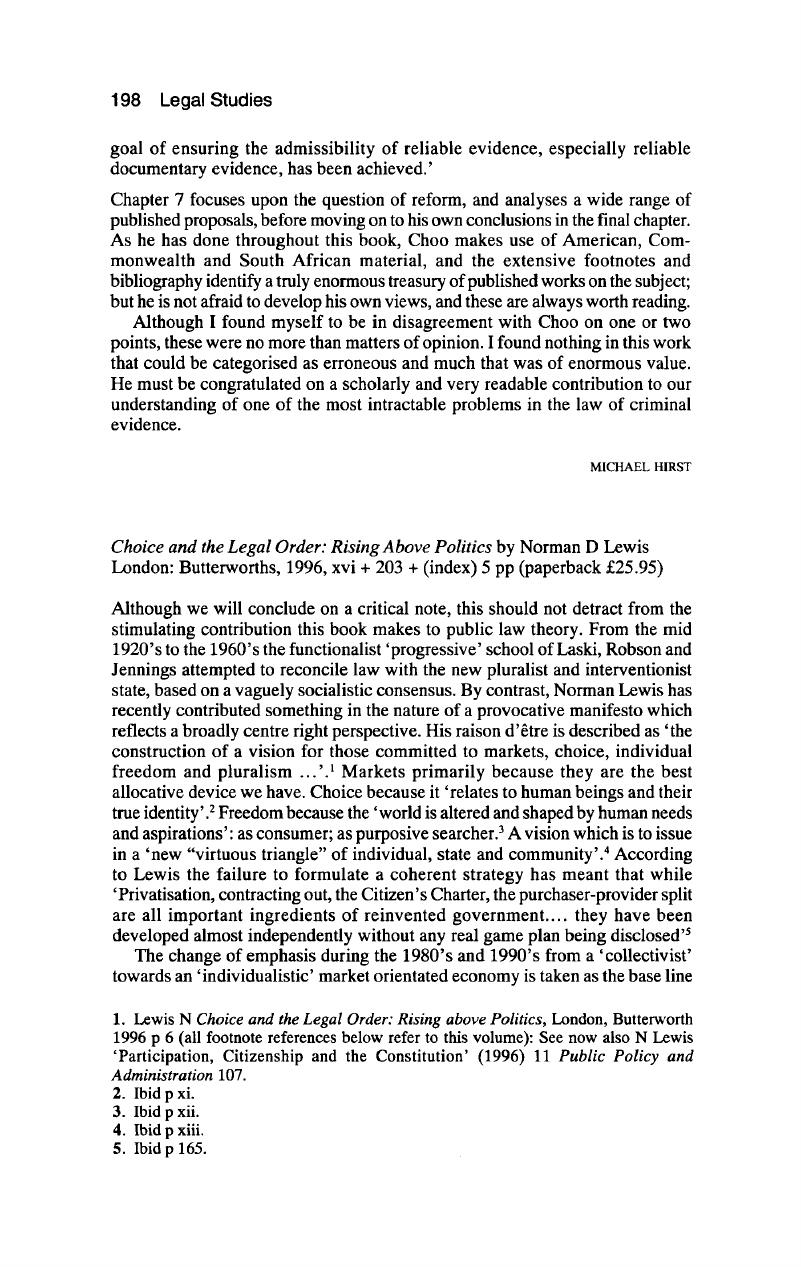No CrossRef data available.
Published online by Cambridge University Press: 02 January 2018

1 Lewis, N. Choice and the Legal Order: Rising above Politics , London, Butterworth 1996 p 6 Google Scholar (all footnote references below refer to this volume): See now also N Lewis ‘Participation, Citizenship and the Constitution’ (1996) 11 Public Policy and Administration 107.
2 Ibid p xi.
3 Ibid p xii.
4 Ibid p xiii.
5 Ibid p 165.
6 Ibid p 154.
7 Ibid p 9.
8 Ibid p 7.
9 Ibid p 79.
10 Ibid p 133.
11 However, there are many problems involved with any comparative analysis. See Legrand P ‘How to Compare Now’ (1996) 16 Legal Studies 232.
12 Ibid p 143ff.
13 Allan, T. R. S. Law, Liberty And Justice: The Legal Foundations of British Constitutionalism (Oxford: Clarendon Press, 1996)Google Scholar.
14 Habermas, J. Between Facts and Norms: Contributions To A Discourse Theory of Law And Democracy (Cambridge: MIT Press, 1996).Google Scholar
15 Lewis 1996, op cit p 109.
16 Ibid p 135.
17 Ibid p 143.
18 See Laws Sir J' Is the High Court the Guardian of Fundamental Constitutional Rights? (1993) Public Law 59; ‘Law and Democracy’ (1995) Public Law 72.
19 Lewis, op cit p 134.
20 Ibid p 142.
21 Ibid p vx.
22 Ibid p 41.
23 Ibid p 178ff.
24 Ibid p 12.
25 Ibidch7.
26 Ibidp 28ff.
27 Ibid p 108.
28 Ibid p 108ff (Lewis refers to 1995 edition see below n 31 for reference to the 1996 edition).
29 The concept of trust is mentioned by Lewis (pxv) but it is not prioritised as in Hutton.
30 Howarth, A. Anti-Libertarianism: Markets, Philosophy and Myth (London: Routledge, 1994) p 20.Google Scholar
31 Hutton, W. The State We're In (London: Cape 2nd edn 1996) pp 306 and 340.Google Scholar
32 Lewis 1996 p 11 Iff.
33 J K Galbraith ‘False Economies’New Statesman and Society, 18 February 1994, based on an inaugural speech at the opening of Sheffield University's Political Economy Research Centre in January 1994. See now also Galbraith, The Good Society: The Human Agenda (Sinclair-Stevenson, 1996).Google Scholar
34 See for example, Gray, J. Beyond the New Right: Markets, Government and the Common Environment , 1993 London, Routledge;Google Scholar and Enlightenment's Wake: Politics and Culture at the Close of the Modern Age, (London: Routledge, 1995).
35 Lewis op cit p 201.
36 Ibid p xi.
37 Ibid p 8.
38 Eagleton, T. Ideology: An Introduction , 1991 (London: Verso) p 222–3.Google Scholar (Note, the concept of ideology is complex but we have no space to deal with it here.)
39 Donovan, C A O' New Settlement Between the Sexes? Constitutional Law and the Citizenship of Women' in (ed Bottomley, A.) Feminist Perspectives on the Foundational Subjects of law , (London: Cavendish, 1996).Google Scholar
40 Foucault, M. (ed C., Gordon) Powerl Knowledge: Selected Interviews & Other Writings 1972–1977 (N York: Pantheon, 1980).Google Scholar
41 Lewis op cit p 4 & p 12.
42 See R v Cambridge District Health Authority, ex p B [1995] 1 WLR 898, CA.
43 Lewis op cit p 150.
44 MacPherson, C. B. The Real World of Democracy (Oxford UP, 1996).Google Scholar
45 Chomsky, N. World Orders, Old And New (London: Pluto Press, 1994).Google Scholar
46 Howarth 1994 op cit p 103.